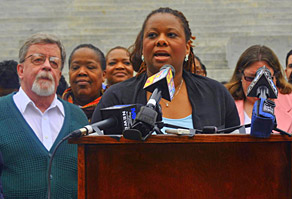
This week, on the steps of the capitol in Jackson, ACLU of Mississippi Executive Director Nsombi Lambright unveiled a new report and urged lawmakers to take action to reform Mississippi's harsh and ineffective criminal justice system.
Mississippi has some of the most draconian sentencing laws in the nation. Sentences under these laws have resulted in overcrowded prisons, the overincarceration of African-Americans, and a ballooning financial strain on the state, making Mississippi the second-largest incarcerator in the nation. The state is fast on the heels of Louisiana, the current leader in this dismal race. This is quite a feat, considering the U.S. is the largest incarcerator in the world — higher than Russia, Cuba, Iran, and yes, even China.
It was under the unimaginably harsh laws of Mississippi that the now-famous Scott Sisters, Jamie and Gladys, were sentenced to two consecutive life terms in state prison for a robbery in which they stole $11 when they were teenagers. Earlier this year, after spending 16 years in prison, the two women were released on parole in a rare move by the governor — because Jamie Scott's kidneys were failing. As the ACLU of Mississippi notes, the Scott Sisters' 16-year incarceration represents yet another blotch in the state's history of racial injustices within the criminal justice system.
The ACLU's new report, entitled Numbers Game: The Vicious Cycle of Incarceration in Mississippi's Criminal Justice System, coauthored with Justice Strategies, reveals the depth and severity of Mississippi's overincarceration problem. The report investigates some of the most troubling aspects of the state's criminal justice system — including the state's drug sentencing scheme, use of federally funded drug task forces, and the use of confidential informants.
The report's disturbing conclusion is clear: excessively harsh and punitive sentences for low-level, nonviolent drug crimes feed a racially discriminatory criminal justice system that fails to protect the public's safety and wastes precious taxpayer dollars. Among its findings, the report concludes that African-Americans in Mississippi are three times more likely than their white counterparts to end up in prison on drug charges, even though drug use rates across the state are virtually identical for blacks and whites. And because the state's drug task force funding is contingent upon securing convictions, low-level drug offenders ensnared in the system feel compelled to become confidential informants who are used indiscriminately to ramp up the quantity of drug arrests with little regard to the quality of the cases they help to build.
Numbers Game is more than just a report; it's a call to action. The ACLU of Mississippi distributed the report to several key lawmakers in an effort to encourage policymakers to make use of the report's alarming findings and its thoughtful recommendations. Along with emphasizing Mississippi's disturbingly high rate of incarceration, the report opens up an important dialogue for law and policymakers that is slowly unfolding in other states as well. Building on the report, this weekend the ACLU of Mississippi will be hosting a Criminal Justice Reform Conference discussing the overincarceration of women in the state, and the specific case of the Scott Sisters.
Now more than ever, states need to respond to drug abuse and addiction with treatment-based solutions, rather than the unrelentingly punitive response that we have relied on with such failure. These types of policies that rely on lengthy prison sentences as the only consequences for violations of the law are draining our state budgets. Citizens in Mississippi cannot afford to rely on few-and-far-between exceptions like that in the Scott case to correct the errors committed by our harsh sentencing laws and prison policies. The people of Mississippi deserve a criminal justice system that promotes public safety, treats people fairly — regardless of the size of their pocketbook or the color of their skin— and use public resources wisely. It's time to address these needs, and end the corruption that has poisoned the corrections system — not just in Mississippi, but across our country.
Learn more about overincarceration: Subscribe to our newsletter, follow us on Twitter, and like us on Facebook.

